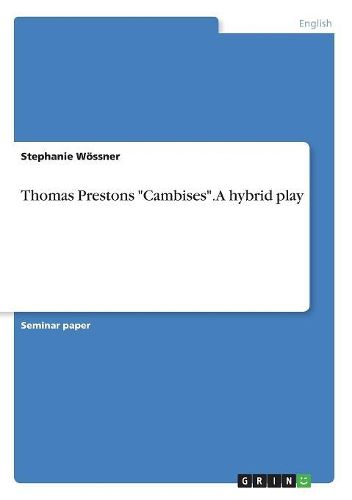Readings Newsletter
Become a Readings Member to make your shopping experience even easier.
Sign in or sign up for free!
You’re not far away from qualifying for FREE standard shipping within Australia
You’ve qualified for FREE standard shipping within Australia
The cart is loading…






Seminar paper from the year 2004 in the subject English Language and Literature Studies - Literature, grade: 2, University of Tubingen (Anglistik), course: HS - Mediaevistik: Pre-Shakespearan Drama: From Mankind to Marlowe, language: English, abstract: In this paper, I am going to show that the play "Cambises" by Thomas Preston is a very complex play combining different kinds of traditions, namely the morality play, the history play, the (de casibus) tragedy, and the comedy or farce. After some general remarks concerning the time the play was written, its author, the content of the play and Shakespeare's knowledge of the play, I am going to explain in detail how each of these traditions comes into play by showing in how far the play matches the definitions of each tradition. This will be followed, in each instance, by a hypothesis about the different traditions' intentions. I will, then, briefly look at the influence of Orientalism on the play. The conclusion will, first of all, sum up this paper, and, afterwards, address some open questions that could not be addressed in this paper but would still be interesting to look at in order to get a better understanding of the play.
$9.00 standard shipping within Australia
FREE standard shipping within Australia for orders over $100.00
Express & International shipping calculated at checkout
Seminar paper from the year 2004 in the subject English Language and Literature Studies - Literature, grade: 2, University of Tubingen (Anglistik), course: HS - Mediaevistik: Pre-Shakespearan Drama: From Mankind to Marlowe, language: English, abstract: In this paper, I am going to show that the play "Cambises" by Thomas Preston is a very complex play combining different kinds of traditions, namely the morality play, the history play, the (de casibus) tragedy, and the comedy or farce. After some general remarks concerning the time the play was written, its author, the content of the play and Shakespeare's knowledge of the play, I am going to explain in detail how each of these traditions comes into play by showing in how far the play matches the definitions of each tradition. This will be followed, in each instance, by a hypothesis about the different traditions' intentions. I will, then, briefly look at the influence of Orientalism on the play. The conclusion will, first of all, sum up this paper, and, afterwards, address some open questions that could not be addressed in this paper but would still be interesting to look at in order to get a better understanding of the play.